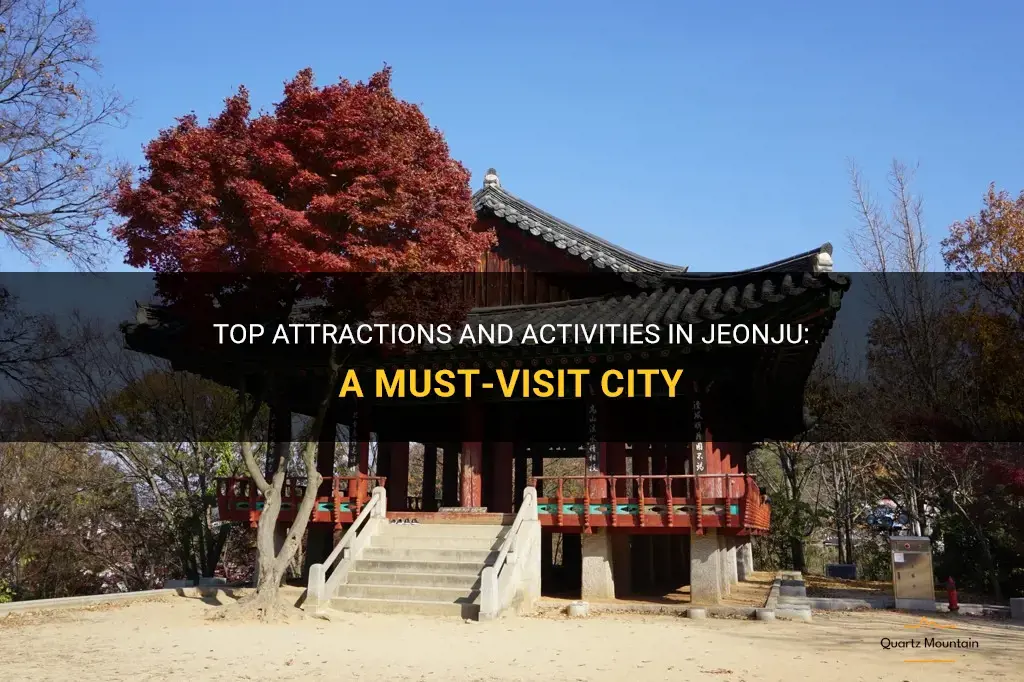
Jeonju, a city in South Korea, is a hidden gem that should be on every traveler's bucket list. With its blend of rich history, stunning traditional architecture, and mouth-watering cuisine, it is no wonder that Jeonju has become a must-visit destination for both locals and tourists. From exploring ancient palaces and temples to indulging in delicious street food and experiencing the vibrant art scene, there is something for everyone in this captivating city. Whether you are a history buff, a foodie, or an art enthusiast, Jeonju offers a myriad of attractions and activities that are sure to leave you in awe. So pack your bags and get ready for an unforgettable journey through the top attractions and activities in Jeonju.
| Activity | Description |
|---|---|
| Hanok Village | Explore the traditional houses and experience the traditional culture of Jeonju. |
| Jeonju Museum | Visit the museum to learn about the history and culture of Jeonju. |
| Omokdae | Climb up the hill to enjoy a panoramic view of Jeonju Hanok Village. |
| Jeonju Hanji Museum | Discover the art of traditional Korean paper-making and create your own hanji crafts. |
| Nambu Market | Experience the bustling atmosphere of a traditional Korean market and try local street food. |
| Jeonju Zoo | Spend a day with the animals and enjoy various animal shows and exhibits. |
What You'll Learn
- Jeonju Hanok Village: Explore traditional Korean architecture and culture
- Gyeonggijeon Shrine: Visit this historical shrine and its beautiful surrounding gardens
- Nambu Market: Shop for local food and souvenirs in this bustling market
- Omokdae and Imokdae: Hike to these scenic viewpoints for panoramic views of Jeonju
- Jeonju World Cup Stadium: Catch a football match or take a stadium tour
- Jeondong Catholic Church: Admire the stunning Gothic architecture of this unique church
- Hanji Museum: Learn about traditional Korean papermaking techniques
- Jeonju Zoo: Visit the zoo to see a variety of animals and enjoy family-friendly activities

Jeonju Hanok Village: Explore traditional Korean architecture and culture
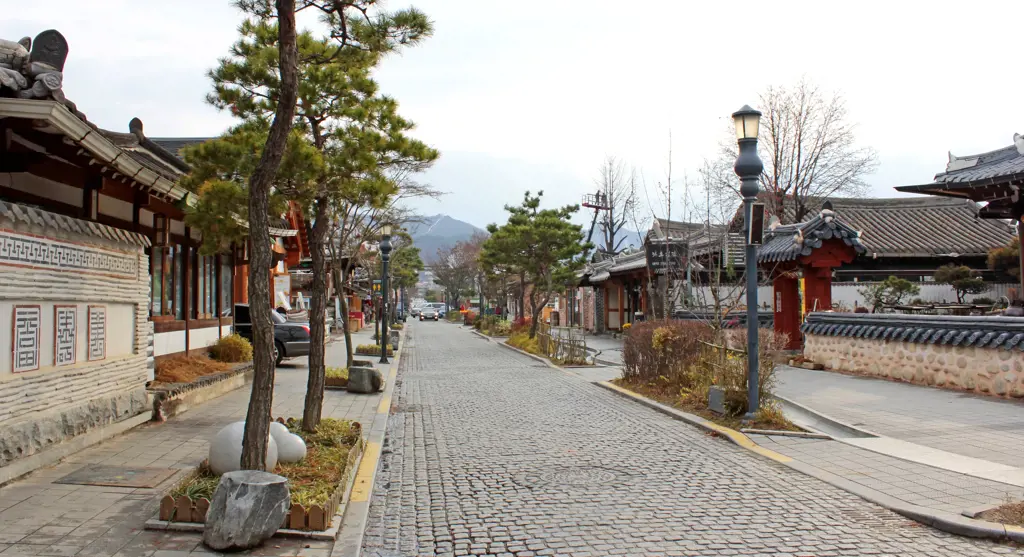
| Characteristic | Description |
|---|---|
| Name | Jeonju Hanok Village |
| Type | Tourist attraction in Jeonju, South Korea |
| Rating / Review count | 4.1 / 27,164 |
| Address | 99 Girin-daero, Wansan-gu, Jeonju-si, Jeollabuk-do, South Korea |
| Phone | +82 63-282-1330 |
| Hours | Friday - Open 24 hours Saturday - Open 24 hours Sunday - Open 24 hours Monday - Open 24 hours Tuesday - Open 24 hours Wednesday - Open 24 hours Thursday - Open 24 hours |
Located in the Jeonju city of South Korea, the Jeonju Hanok Village offers a unique opportunity to explore the traditional Korean architecture and immerse yourself in the rich cultural heritage of the country. With its well-preserved hanok (traditional Korean houses), traditional food, and various cultural activities, the village has become a popular destination for both locals and tourists alike.
The highlight of the Jeonju Hanok Village is undoubtedly its hanok houses. These traditional wooden houses feature curved roofs, wooden pillars, and beautiful interior designs that showcase the craftsmanship and aesthetic sensibilities of the Korean people. Walking through the village, you can marvel at the intricate details of these houses and get a glimpse into the traditional way of life.
One of the must-visit spots in the village is the Jeonju Traditional Culture Center. Here, you can learn more about the history and significance of hanok houses through various exhibitions and workshops. The center also offers hanbok (traditional Korean clothing) rentals, allowing you to dress up and experience the traditional Korean culture firsthand.
Another highlight of the Jeonju Hanok Village is its food. Jeonju is known for its delicious traditional cuisine, and the village is dotted with numerous restaurants and street food stalls where you can indulge in local specialties. The most famous dish in the area is bibimbap, a mixed rice dish topped with various vegetables, meat, and a spicy sauce. You can savor this iconic dish in one of the many bibimbap restaurants in the village and experience its rich flavors.
Apart from the hanok houses and the food, the Jeonju Hanok Village also offers a range of cultural activities to engage visitors. You can participate in traditional hanji (traditional Korean paper) making workshops, try your hand at making traditional crafts, or watch performances of traditional Korean music and dance. These activities provide a deeper understanding of the local culture and allow you to appreciate the beauty and traditions of Korea.
If you are planning a trip to South Korea and want to experience the traditional Korean culture and architecture, make sure to include the Jeonju Hanok Village in your itinerary. With its charming hanok houses, delectable food, and immersive cultural activities, it is the perfect place to explore the unique heritage of the country and create lasting memories.
14 Must-Do Experiences in Venice, Louisiana
You may want to see also

Gyeonggijeon Shrine: Visit this historical shrine and its beautiful surrounding gardens
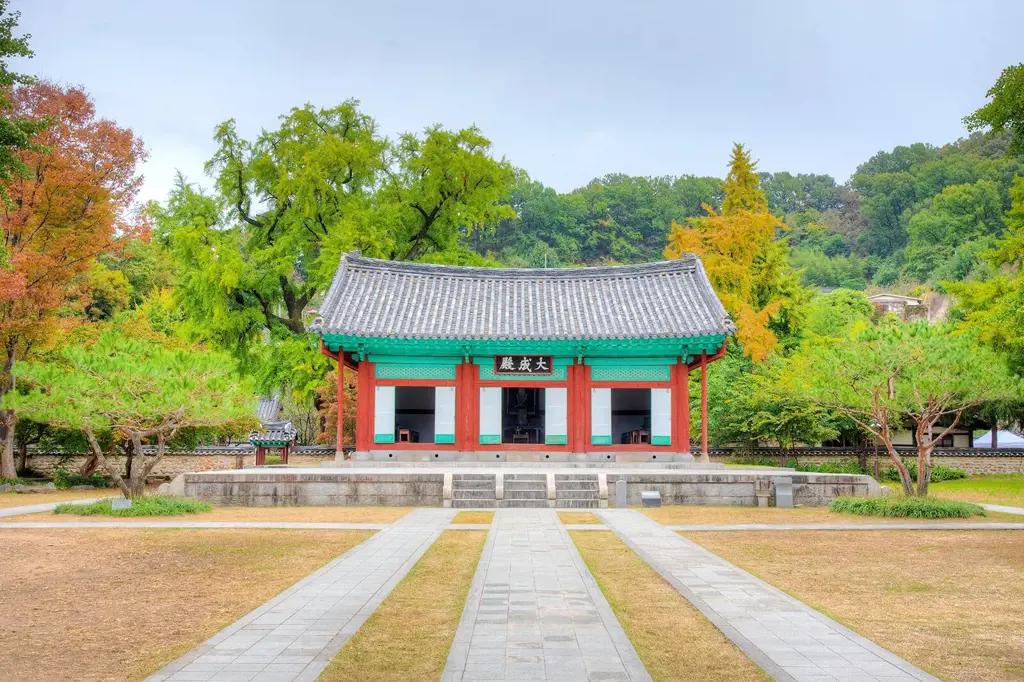
| Characteristic | Description |
|---|---|
| Name | Gyeonggijeon |
| Type | Historical landmark in Jeonju, South Korea |
| Rating / Review count | 4.3 / 1,495 |
| Address | 44 Taejo-ro, Wansan-gu, Jeonju-si, Jeollabuk-do, South Korea |
| Phone | +82 63-287-1330 |
| Hours | Friday - 9 AM–6 PM Saturday - 9 AM–6 PM Sunday - 9 AM–6 PM Monday - 9 AM–6 PM Tuesday - 9 AM–6 PM Wednesday - 9 AM–6 PM Thursday - 9 AM–6 PM |
Gyeonggijeon Shrine is a must-visit historical site located in the beautiful city of Jeonju, South Korea. This shrine holds great significance in Korean history and is surrounded by breathtaking gardens that add to its charm.
The Gyeonggijeon Shrine was built in 1410 to honor King Tae-jo, the founder of the Joseon Dynasty. It serves as a memorial to him and enshrines his portrait. The shrine complex is a symbol of Korea's rich cultural heritage and provides a glimpse into the country's past.
The main hall of the shrine, Daejeokjeon, is an architectural masterpiece. It is an elegant wooden structure adorned with intricate carvings and beautiful paintings. Inside, visitors can pay their respects to King Tae-jo and learn about his contributions to the country.
One of the highlights of the Gyeonggijeon Shrine is its stunning garden. The garden is meticulously landscaped and features various traditional elements, such as pavilions, ponds, and walking paths. The lush greenery and the peaceful atmosphere make it an ideal place for relaxation and reflection.
In addition to its historical and natural beauty, the Gyeonggijeon Shrine offers cultural activities for visitors to experience. Traditional Korean performances, such as musical performances and dances, are regularly held at the shrine. These performances provide a glimpse into Korean traditions and enhance the overall experience of visiting the shrine.
Visiting Gyeonggijeon Shrine is a journey back in time, allowing visitors to immerse themselves in Korea's rich history and culture. The serene surroundings and the impressive architecture make it a perfect place to escape the hustle and bustle of modern life.
To make the most of your visit to the Gyeonggijeon Shrine, it is recommended to take a guided tour. Knowledgeable guides can provide insights into the history and significance of the shrine, making the visit even more informative and meaningful.
Getting to the Gyeonggijeon Shrine is easy, as it is located in the heart of Jeonju city. The shrine is easily accessible by public transportation, and there are also parking facilities available for those traveling by car.
In conclusion, a visit to Gyeonggijeon Shrine in Jeonju is a must for anyone interested in Korean history and culture. The shrine's stunning architecture, beautiful gardens, and cultural activities make it a perfect destination for both locals and tourists. Take the time to appreciate the historical significance of this shrine and soak in the serene atmosphere of its surrounding gardens.
10 Must-Do Activities in Neptune Beach, FL
You may want to see also

Nambu Market: Shop for local food and souvenirs in this bustling market
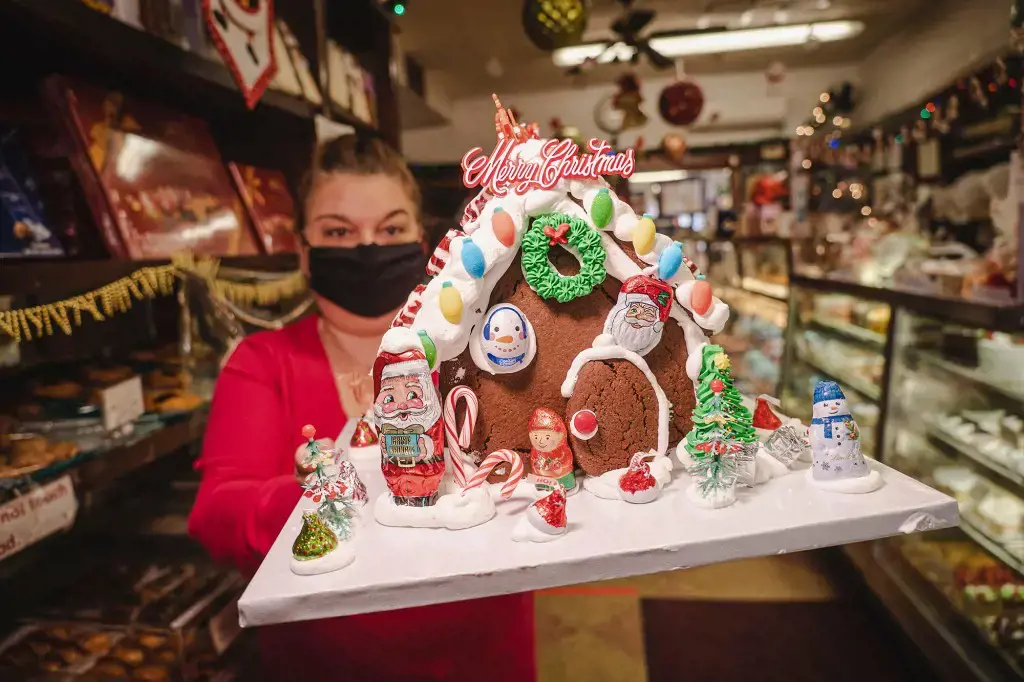
Nambu Market is a popular destination in Jeonju, South Korea, known for its wide variety of local food and souvenirs. Located in the heart of the city, this bustling market draws both locals and tourists alike who are looking to experience the vibrant atmosphere and taste the flavors of Jeonju.
At Nambu Market, visitors can find an array of fresh produce, meats, seafood, and traditional Korean dishes. The market is particularly famous for its bibimbap, a traditional Korean rice dish mixed with various vegetables, meats, and sauces. Tourists often flock to Nambu Market to sample this iconic Jeonju dish, which is known for its savory flavors and colorful presentation. There are numerous stalls and restaurants within the market that serve bibimbap, each with their own unique twist on the dish.
In addition to bibimbap, Nambu Market offers a wide selection of other local delicacies, such as jeon, a Korean-style pancake made with various ingredients such as seafood, vegetables, and meat. Visitors can also find a variety of street foods like tteokbokki (spicy rice cakes), gimbap (seaweed rice rolls), and hotteok (sweet pancakes filled with brown sugar syrup).
Apart from food, Nambu Market is also a great place to shop for souvenirs and traditional handicrafts. The market is filled with shops and stalls selling hanbok, traditional Korean clothing, as well as local handicrafts, pottery, and artworks. Visitors can find unique and authentic Korean souvenirs to commemorate their trip to Jeonju.
The market's vibrant and energetic atmosphere adds to the overall experience of visiting Nambu Market. People can expect to see bustling crowds, lively bargaining, and enthusiastic vendors promoting their products. The narrow alleyways and bustling streets are filled with colorful signs, umbrellas, and various enticing aromas from the food stalls.
Navigating through the market can be a bit overwhelming due to its size and popularity, but it is certainly worth the adventure. Exploring Nambu Market offers a chance to truly immerse oneself in the local culture and get a taste of authentic Jeonju cuisine and traditional crafts. Whether you are a food lover, a culture enthusiast, or a shopaholic, Nambu Market is a must-visit destination in Jeonju, providing an unforgettable experience for all.
12 Fun Things to Do the Day After Thanksgiving
You may want to see also

Omokdae and Imokdae: Hike to these scenic viewpoints for panoramic views of Jeonju

Jeonju, located in the North Jeolla Province of South Korea, is a city known for its rich history, cultural heritage, and stunning natural landscapes. One of the best ways to experience the beauty of Jeonju is by hiking to the scenic viewpoints of Omokdae and Imokdae.
Omokdae and Imokdae are two hills located in the heart of Jeonju. These hills offer panoramic views of the city and are popular among both locals and tourists. The hike to these viewpoints is relatively easy, making it accessible to people of all ages and fitness levels.
To reach Omokdae, one can start from the Jeonju Hanok Village, a traditional village known for its traditional Korean houses, called hanoks. As you hike up the hill, you'll pass through narrow alleys and charming streets lined with hanoks, giving you a glimpse into the city's traditional past. Once you reach the top, you'll be rewarded with a breathtaking view of the entire city, with its tiled roofs and surrounding mountains. On a clear day, you can even spot the distant mountains of Deokjin Park and the Hanok Village.
Imokdae, on the other hand, is located near the Jeonju Zoo, another popular attraction in the city. The hike to Imokdae is relatively shorter but equally rewarding. As you make your way up the hill, you'll be surrounded by lush greenery and towering trees. Once you reach the top, you'll be greeted by a mesmerizing view of the Jeonju Hanok Village, the city's modern skyline, and the sprawling countryside. The sight of the sun setting over the horizon from Imokdae is truly a sight to behold.
Both Omokdae and Imokdae are also significant historical sites in Jeonju. Omokdae, in particular, holds a special place in Korean history as it was a strategic location during the Imjin War in the late 16th century. It was from this hill that General Yi Seonggye, later known as King Taejo, led his troops to victory against the invading Japanese forces. Today, a monument stands tall at the top of Omokdae, commemorating this historic event.
Aside from the stunning views, Omokdae and Imokdae also offer a peaceful and tranquil atmosphere, making them perfect spots for relaxation and leisurely walks. The hills are surrounded by beautiful gardens, where you can sit and enjoy the serene surroundings. Many visitors also bring a picnic basket and spend a pleasant afternoon enjoying the view and the company of loved ones.
In conclusion, hiking to the scenic viewpoints of Omokdae and Imokdae is a must-do activity when visiting Jeonju. Not only do these hills offer breathtaking views of the city and its surroundings, but they also provide a glimpse into the city's rich history. Whether you're a nature lover, a history enthusiast, or simply seeking a peaceful retreat, a hike to Omokdae and Imokdae will not disappoint.
12 Fun Things to Do in West Haven, CT
You may want to see also

Jeonju World Cup Stadium: Catch a football match or take a stadium tour
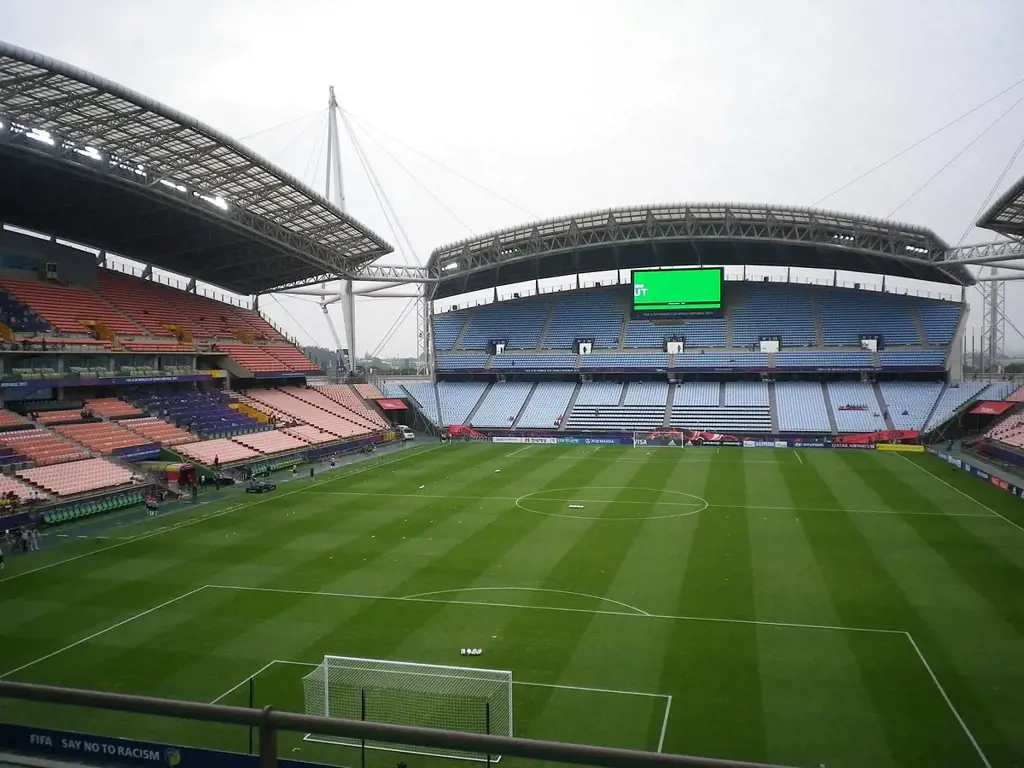
Jeonju is a city in South Korea that is known for its rich history, vibrant culture, and delicious cuisine. One of the must-visit attractions in Jeonju is the Jeonju World Cup Stadium. This state-of-the-art sports facility is not only a venue for football matches but also offers stadium tours for visitors.
The Jeonju World Cup Stadium was built for the 2002 FIFA World Cup, which was co-hosted by South Korea and Japan. It has a seating capacity of over 42,000 and is the home stadium for the Jeonbuk Hyundai Motors FC, a professional football club in South Korea. The stadium is located in the northern part of Jeonju, making it easily accessible for locals and tourists alike.
For football enthusiasts, catching a match at the Jeonju World Cup Stadium is a must-do activity. The atmosphere during the games is electric, with passionate fans cheering on their favorite teams. Whether you are a fan of the local Jeonbuk Hyundai Motors or want to experience the thrill of a professional football match, attending a game at this stadium is an unforgettable experience.
If you're not able to catch a match, don't worry. The Jeonju World Cup Stadium also offers stadium tours, allowing visitors to explore the facility and learn about its history. During the tour, you will get a behind-the-scenes look at the locker rooms, player tunnels, and even the pitch itself. Knowledgeable guides will share interesting facts and stories about the stadium and its role in hosting international football events.
The stadium tours are a fantastic opportunity to learn more about the 2002 World Cup and the impact it had on Jeonju and South Korea as a whole. It was a momentous event for the country, as it was the first time the World Cup was held in Asia. The Jeonju World Cup Stadium played a significant role in hosting the matches, and the tour allows visitors to immerse themselves in this historic event.
Aside from football matches and stadium tours, the Jeonju World Cup Stadium is also used for other events and activities. It has hosted international friendly matches, national team training camps, and even concerts and performances. The versatile nature of the stadium makes it a popular venue for various events throughout the year.
In conclusion, if you find yourself in Jeonju, make sure to visit the Jeonju World Cup Stadium. Whether you catch a football match or take a stadium tour, it is an experience you won't want to miss. Immerse yourself in the excitement of the game, learn about the stadium's history, and create lasting memories in this iconic sports facility in Jeonju.
14 Unique Ways to Memorialize a Loved One
You may want to see also

Jeondong Catholic Church: Admire the stunning Gothic architecture of this unique church
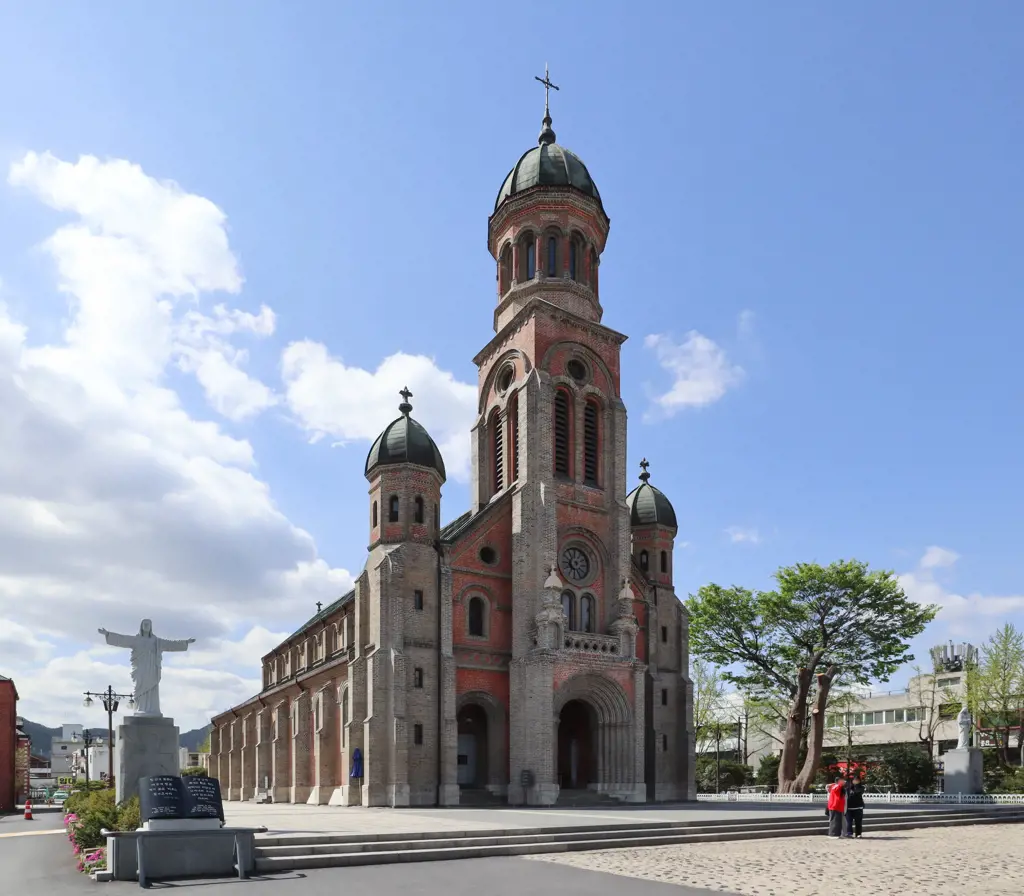
| Characteristic | Description |
|---|---|
| Name | Jeondong Cathedral |
| Type | Catholic church in Jeonju, South Korea |
| Website | Go to website |
| Rating / Review count | 4.4 / 3,558 |
| Address | 51 Taejo-ro, Wansan-gu, Jeonju-si, Jeollabuk-do, South Korea |
| Phone | +82 63-284-3222 |
Jeonju is a beautiful city in South Korea that is known for its rich history and cultural heritage. One of the most famous landmarks in Jeonju is the Jeondong Catholic Church, a stunning building that showcases Gothic architecture.
The Jeondong Catholic Church is located in the heart of Jeonju's historic district and is a must-visit for anyone interested in architecture or religious history. The church was built in 1914 and is the oldest Catholic church in Jeonju. It has been designated as a national cultural asset, and it is easy to see why once you step inside.
As you approach the church, you are immediately struck by its majestic presence. The exterior of the church is adorned with intricate carvings and beautiful stained glass windows, which give it a sense of grandeur. The spires of the church reach towards the sky, creating an awe-inspiring sight.
Once you enter the church, you are greeted by a breathtaking interior. The high vaulted ceilings, detailed murals, and ornate decorations all contribute to the Gothic style of the church. The beauty and attention to detail in the design are truly remarkable.
Aside from its architectural beauty, the Jeondong Catholic Church also holds a significant historical and religious importance. The church played a crucial role in the spread of Catholicism in Jeonju and continues to be a place of worship for many locals. It is a serene and tranquil place, perfect for reflection and contemplation.
Visiting the Jeondong Catholic Church is a unique experience that allows you to appreciate both the beauty of its architecture and the religious significance it holds. Whether you are a history enthusiast, an architecture lover, or simply looking for a peaceful place to visit, this church is a must-see when in Jeonju.
Overall, Jeondong Catholic Church is a testament to the rich history and cultural heritage of Jeonju. Its stunning Gothic architecture and religious significance make it a must-visit attraction for anyone traveling to the city. So, if you find yourself in Jeonju, be sure to take some time to admire the beauty and tranquility of this unique church.
12 Awesome Things to Do in Chur, Switzerland
You may want to see also

Hanji Museum: Learn about traditional Korean papermaking techniques
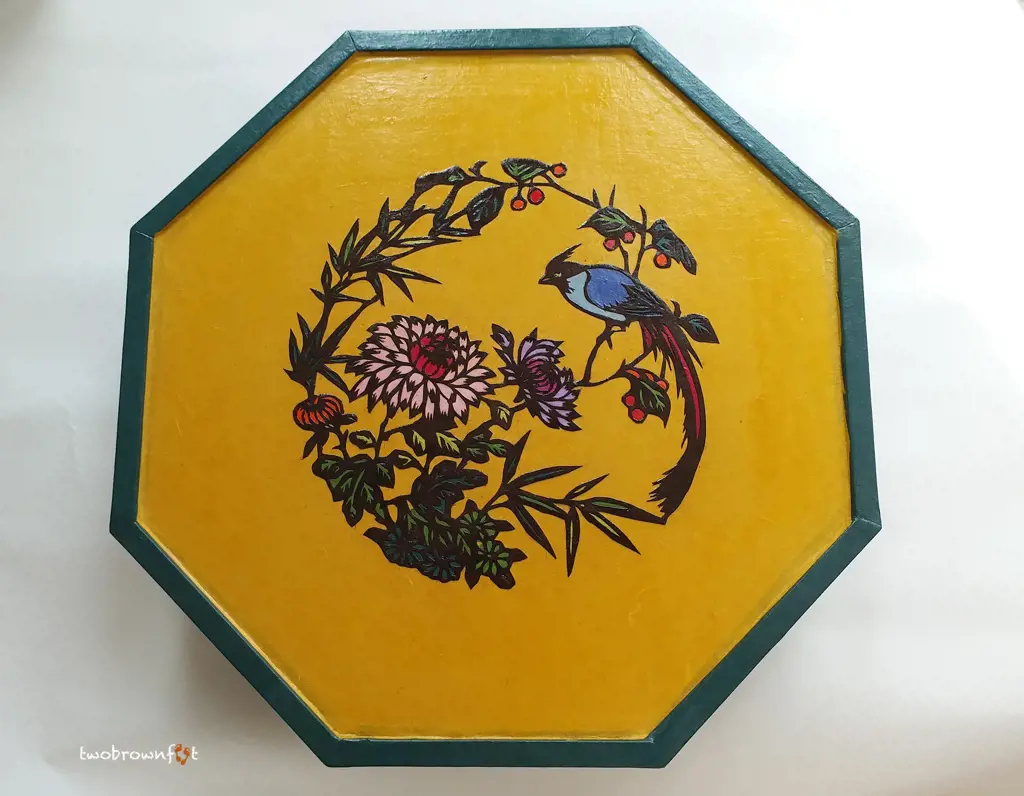
The Hanji Museum in Jeonju is a captivating cultural attraction that allows visitors to learn about the traditional Korean art of papermaking. Hanji, which refers to handcrafted paper made from the inner bark of the mulberry tree, holds an esteemed place in Korean culture due to its durability and unique texture.
The Hanji Museum, located in Jeonju's historic district, showcases the intricate process of making hanji paper. The museum boasts an extensive collection of hanji paper artifacts, including ancient documents, artwork, and everyday objects crafted from hanji.
Upon entering the Hanji Museum, visitors are greeted with a multimedia presentation on the history and significance of hanji. The presentation covers various aspects of hanji papermaking, such as the materials used, the tools employed, and the traditional techniques passed down through generations.
The heart of the museum is the demonstration area, where skilled artisans showcase the craftsmanship involved in creating hanji paper. Visitors can observe each step of the papermaking process, from harvesting the mulberry tree bark to transforming it into a smooth, strong sheet of hanji paper. These artisans have mastered the delicate balance between strength and flexibility inherent in hanji, resulting in a paper that is highly valued for its durability and versatility.
The museum also offers hands-on activities that allow visitors to experience hanji papermaking firsthand. Guided by knowledgeable staff, visitors can try their hand at various steps of the process, such as beating the mulberry tree bark to a pulp and forming the wet paper into a flat sheet. These interactive activities provide a deeper understanding of the time and skill required to create hanji paper.
In addition to its emphasis on tradition, the Hanji Museum also highlights the innovative use of hanji in modern design and artwork. The museum features a gallery that showcases contemporary artworks created using hanji as a medium. From delicate paper sculptures to intricate paper cutouts, these artworks demonstrate the versatility and beauty of hanji paper in contemporary art.
The Hanji Museum in Jeonju is a must-visit for anyone interested in traditional Korean culture and art. The museum's exhibits and demonstrations offer a comprehensive and immersive experience, allowing visitors to learn about the history and technique of hanji papermaking. Whether you are a history buff, an art enthusiast, or simply curious about different cultures, a visit to the Hanji Museum is sure to be an educational and enlightening experience.
12 Fun Things to Do in Stockton, CA
You may want to see also

Jeonju Zoo: Visit the zoo to see a variety of animals and enjoy family-friendly activities
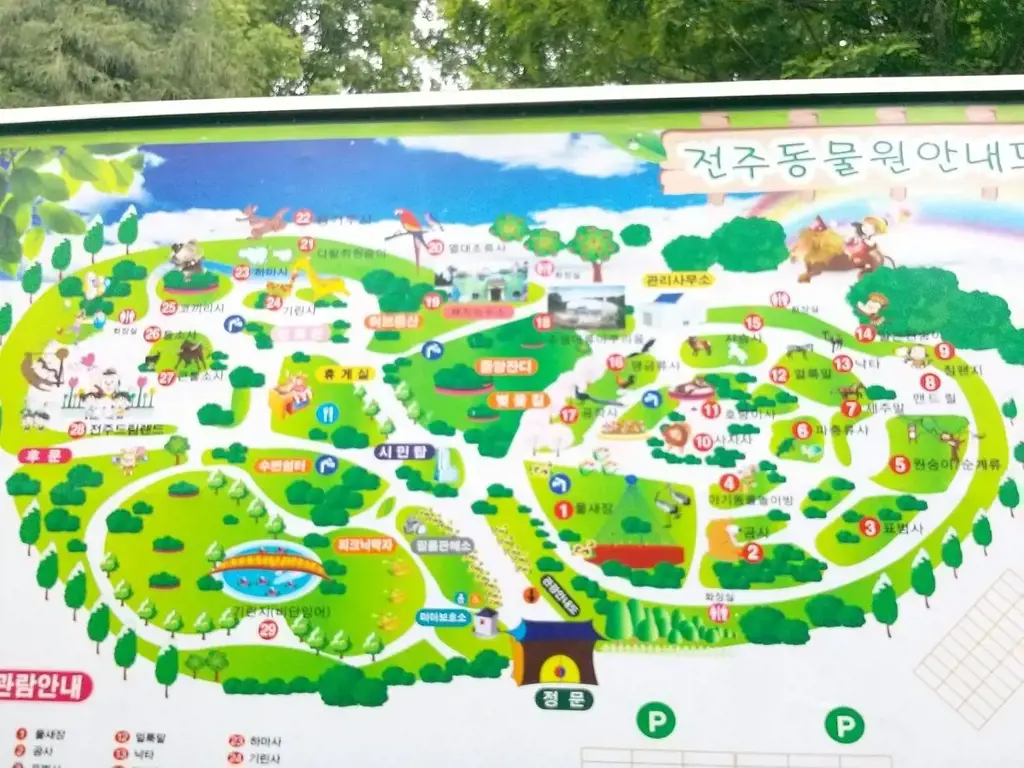
Jeonju Zoo is a popular attraction in Jeonju, South Korea. It is a great place to visit for families looking to spend a fun-filled day together. The zoo is home to a variety of animals that are sure to delight visitors of all ages.
One of the main highlights of the Jeonju Zoo is its collection of exotic animals. Visitors can see animals such as lions, tigers, giraffes, and bears up close and personal. The zoo takes pride in providing a safe and comfortable environment for these animals, ensuring that they are well taken care of.
In addition to the impressive collection of animals, the Jeonju Zoo also offers a range of family-friendly activities. One popular activity is the animal feeding experience, where visitors can feed some of the animals under the supervision of zoo staff. This provides a unique opportunity for children to learn about animal behavior and their dietary needs.
Another highlight of the zoo is the daily animal shows and performances. Visitors can watch talented dolphins perform tricks and stunts, and see birds display their vibrant plumage in the bird show. These shows are both entertaining and educational, as they showcase the natural abilities and behaviors of the animals.
For those looking for a bit of adventure, the Jeonju Zoo also has a safari zone. Visitors can take a guided tour through the safari zone and observe free-roaming animals in a more natural habitat. This allows for a more immersive experience, as visitors can see the animals in a setting that closely resembles their natural environment.
The Jeonju Zoo is also home to a variety of facilities and amenities. There are picnic areas where families can relax and enjoy a meal together, as well as playgrounds where children can burn off some energy. The zoo also has a souvenir shop, where visitors can purchase gifts and mementos to remember their visit.
Overall, the Jeonju Zoo is a must-visit destination for families in Jeonju. With its wide variety of animals, family-friendly activities, and beautiful surroundings, the zoo offers a fun and educational experience for all. Whether you are looking to learn about different animal species or simply enjoy a day out with your loved ones, the Jeonju Zoo is sure to exceed your expectations.
12 Fun-Filled Family Activities in Alaska
You may want to see also
Frequently asked questions
Some popular attractions to visit in Jeonju include Jeonju Hanok Village, Gyeonggijeon Shrine, Omokdae and Imokdae, and Nambu Traditional Market.
Yes, Jeonju hosts several annual events and festivals. One of the most famous is the Jeonju International Film Festival, which showcases international and Korean films. The Jeonju Bibimbap Festival, where visitors can experience and enjoy the traditional Korean dish, is also a must-visit event.
Jeonju is known for its diverse and delicious culinary scene. Food lovers can indulge in trying various local dishes such as bibimbap, bibimbap jeon (pancake), makgeolli (rice wine), and other traditional Korean snacks. Additionally, taking a food tour or exploring the local street food stalls is highly recommended.
Yes, Jeonju has several hiking trails and outdoor activities for nature enthusiasts. One popular hiking spot is Maisan Mountain, known for its unique rock formations and temples. Daecheongho Lake is also a great place for water sports and outdoor activities such as fishing, kayaking, and camping.








3 Comments
Sapphire Steele
Kamilla Henke
AuthorTheodore Weeks